
Donatas Banionis: “Culture is above nationality!”
/ Главная / Russkiy Mir Foundation / Publications / Donatas Banionis: “Culture is above nationality!”Donatas Banionis: “Culture is above nationality!”
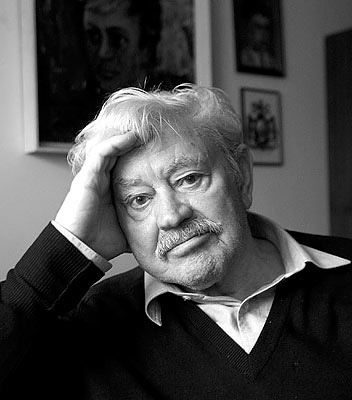
On April 28, Donatas Banionis turned 86 years old. Banionis lives in Vilnius together with his son and his family. Last year he was awarded that the Order of Honor by President Dmitry Medvedev for his contribution to the development of theatrical and film arts and his many years of creative work. Our correspondent spoke with this great actor on the eve of his birthday.
– Of the hundred or so theatrical roles and over fifty film roles, it seems that on the villain in the Adventures of Prince Florizel was the clearly negative character. And other than the role of the kolkhoz chairman, your heroes have been apolitical. Weren’t you offered to play party leaders or, later, political leaders?
– Never. And I would have probably declined if offered. But they weren’t, and it wasn’t necessary. Politics is not my thing. My director Juozas Miltinis always said that an artist must be a person and not belong to any party – he must be above the party. And he never belonged to the party, and died that way. Miltinis was fired from the theater because he did not want to join the party. He roamed around for five years, and then with the change in political powers he was allowed to return to the Panev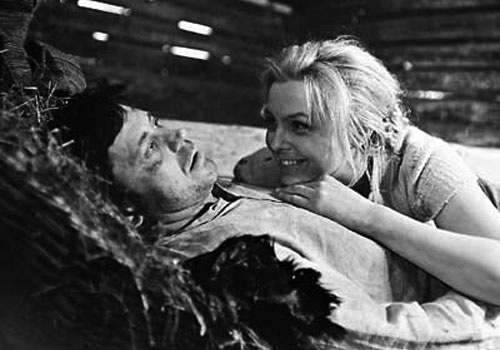
– Nonetheless, there are issues one must take a stance one. Which regardless of how hard you try will be political in nature. Take for example, the issue of Russian language and Russian culture. Do you think that Lithuanian schools should pay a lot of attention to Russian culture?
– The entire spectrum of culture should be studied, including Russian. In my youth I read Dostoyevsky's Crime and Punishment, albeit in the Lithuanian language. I was only 15. And I was amazed! Such an amazing culture. Tolstoy, Dostoyevsky, Chekhov… The general culture of mankind should be considered, and not divided up: Russian – not Russian… Culture is above nationality. If an author understands issues concerning all of mankind, then he rises above these narrow national definitions.
– In the Soviet Union you were such an example of a cultural phenomenon that rises above nationality. The best film studios and even theaters dreamed of working with actors of such stature. But you worked your entire life in the modest provincial Panev – And you started working at the theater from the first day that it was formed? – At that time I studied in Kaunas at a technical college. When the Panev – Right now Lithuanian directors are very popular in Russia. Why do think this is? – It’s a mystery to me. The directors who are working in Russia are really not my directors. Miltinisis had different principles. He was certain that theater should be like life. And some were critical of this: “Theater should have poses and intonations.” Miltinisis studied in France, but nonetheless he strove for naturalness. “You don’t know how to act,” we were told. But we didn’t want to act. We wanted to be alive. But modern Lithuanian directors are theatrical. The emphasis is placed on theatrical persona and intonations rather than real people on stage. I watch modern interpretations of classics and I don’t recognize them. Of course, this doesn’t mean that I am always right. It’s just not my thing. I can’t insist that everything be the way I would like it to be or how I am accustom to. – But in Soviet films you couldn’t speak Lithuanian. You had roles in many films that were not only made by Lithuanian studios. How difficult was it for you to speak Russian. – At the beginning it was rather difficult, but then I accumulated a lot of practice. I got used to acting in Russian. But they overdubbed me, because nonetheless I had an accent. But I acted in Russian. That’s how the scripts were written. Only the Lithuanian films were completely overdubbed, such as No One Wanted to Die or the German – Goya – oder der arge Weg der Erkenntnis. I was often overdubbed by Alexander Demyanchenko. Did my voice for the film No One Wanted to Die. The film itself is completely in Lithuanian and was overdubbed. Demyanchenko did an excellent job. When I watched it, I was very happy that in certain aspects he even acted better than me… – Did you try to get rid of your accent? – No. The most important aspect was the acting. It is lose an accent. If someone from childhood speaks a different language, it is very difficult to get rid an accent. – Were there any instances in which your voice is heard on screen? – Yes, one. In the film Beware of the Car. According to the scenario, there was a person that was not from Russia but from the Baltic. A pastor. There are no pastors in Russia. So they brought me down to Odessa, to the Black Sea, and I wasn’t supposed to speak in Russian. I counted banknotes in Lithuanian. – Was Tarkovsky difficult to understand? Was it difficult to work with such a renowned filmmaking genius? – It was difficult. I often thought, “What does he want?” And he didn’t explain anything. He would only say, “No, no, no… that’s not it…” And it was clear what was. It was difficult because I didn’t know how it would turn out. Many people didn’t like the film. At first. I even received a letter in which a woman wrote me: “On behalf of ALL viewers we ask that you not participate in such hackwork as Solaris. Yes, I got such a letter from Russia. But, on the other hand, it was very pleasant at the Cannes Film Festival in 1972. It was a very complex film. Not the standard sort. Even the author wasn’t very pleased with it. But Tarkovsky wanted to say: look, researchers, you are striving to understand the cosmos, but look at what is happening on earth with the family of this man. That is what needs to be studied, and not the cosmos. That was his idea. I didn’t always understand what Tarkovsky wanted. Of course, I always did what he said. Prior to shooting the film, I hadn’t seen any of his works. When I was invited to try out for the film, I asked to see Andrei Rublev. The film at that time was banned. They gave me a key and told me to lock myself in the editing room, where I could watch it. I was amazed. I have never seen such great film in my entire life. It has a profound message: there is filth every, horrible things are taking place, and Rublev paints the Trinity. Beauty is the most important thing for the artist. This is what he wanted to say: the Soviet authorities are such filth, but individual rises is above everything. That’s why the film was banned. – Did you like your role in Solaris? – Yes. It was difficult, but I understood that it was not a simple, typical role. Either externally or internally. And I thank God and fate for allowing me to be involved in that film. It was included in the book 1001 Films Must-See Films, and my picture is there. This brings me great joy. – But the Soviet Union got to know you in the role of the village chairman in the film No One Wanted to Die. Has your perception of that film changed following the reassessment of events that took place in it – the Soviet authorities, repression, etc.? – My perception of the film and the role have not changed. I personally know people who disappeared into the forest not because they had some kind of conviction. They believed that the Americans would soon come and the Soviet Union would cease to exist. The only thing left to do was wait it out a couple of months in the forest. Many thought that was the case. And I think that the film was about that. The role turned out to be a very good one. I received an award at a festival in Kiev and then in Karlovy Vary in 1966. And there were a lot of stars in Karlovy Vary. World-renowned actors. And when one of the members of the jury told me that they would be giving me an award the next day, I didn’t believe it. I thought it was a joke. But on the next day the chairman of the jury announced my name… There in Karlovy Vary no one considered the politics. The art was what was important. Political views were irrelevant. And I got the prize not because of my political convictions but because it was a good artistic film. A film about someone who happened to live in those times. And he was killed. Why was he killed? What for? Because two sides were fighting. And he didn’t want to be with one side or the other. He wanted to be a person. That’s why he was killed. I really liked working on that film, which is why I really put my heart into it. There you didn’t need to play the role, you needed to be it. I knew such people, and I brought them to life. – The film depicts the 1940-50s. Was that a difficult time? – The film itself was shot in 1965. Then everything had already changed. Stalin was gone. He did awful things to people… A third of Lithuanian was sent off to Siberia! With little children. They were just born and had to go to Siberia! What for? I cannot reconcile myself with that. I didn’t say anything, of course, otherwise I would have also been sent to Siberia. One thing I don’t understand is why everyone says that the Russians are to blame. Russians themselves were victims. Take Tarkovsky, for example. Today relations between Russia and Lithuania are not very good. I think this is result of those times: the exiles, Siberia, prison, executions… But I have a different perception. I don’t blame Russia. There was a certain order during those times, created on the ideas of Marx and Engels. I don’t want to get involved in the politics. For me, Russians are those wonderful people with whom I worked, conversed and created films.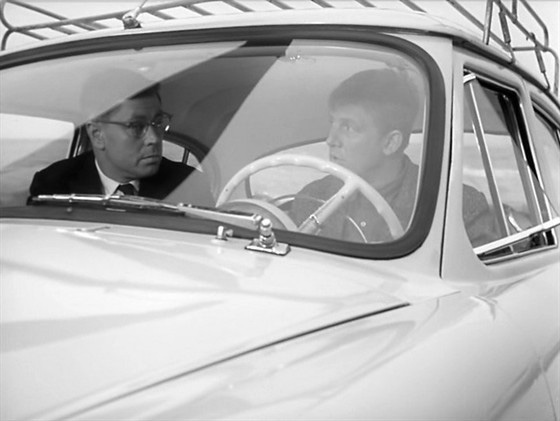
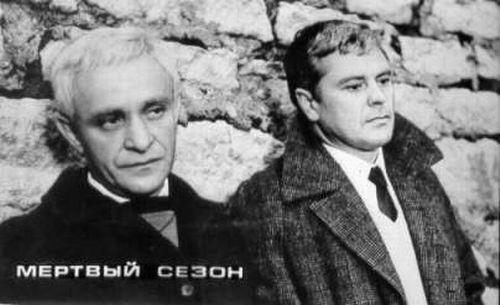
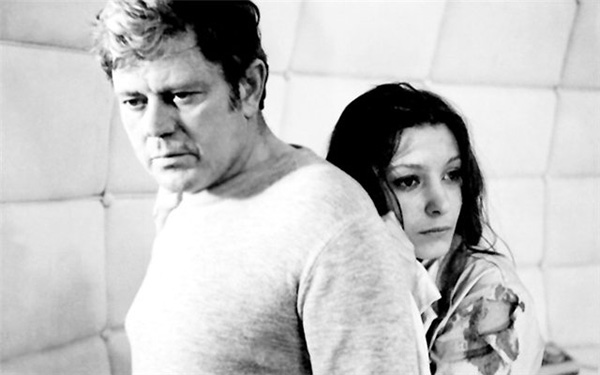
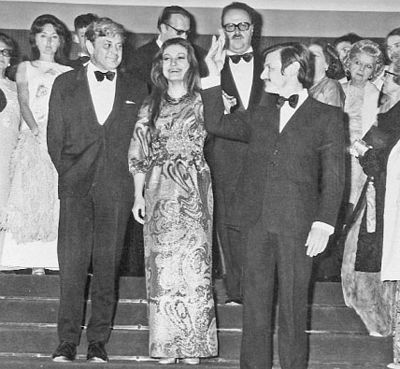
New publications

 Mikhail Kalatozov, a director who transformed the world of cinematography in many ways, was born 120 years ago. He was a Soviet film official and a propagandist. Above all, he was capable of producing movies that struck viewers with their power and poetic language.
Mikhail Kalatozov, a director who transformed the world of cinematography in many ways, was born 120 years ago. He was a Soviet film official and a propagandist. Above all, he was capable of producing movies that struck viewers with their power and poetic language.  Ukrainian authorities have launched a persecution campaign against the canonical Ukrainian Orthodox Church (UOC), the biggest one in the country's modern history. Over the past year, state sanctions were imposed on clergy representatives, searches were conducted in churches, clergymen were arrested, criminal cases were initiated, the activity of the UOC was banned in various regions of the country, and monasteries and churches were seized.
Ukrainian authorities have launched a persecution campaign against the canonical Ukrainian Orthodox Church (UOC), the biggest one in the country's modern history. Over the past year, state sanctions were imposed on clergy representatives, searches were conducted in churches, clergymen were arrested, criminal cases were initiated, the activity of the UOC was banned in various regions of the country, and monasteries and churches were seized.  When Nektary Kotlyaroff, a fourth-generation Russian Australian and founder of the Russian Orthodox Choir in Sydney, first visited Russia, the first person he spoke to was a cab driver at the airport. Having heard that Nektariy's ancestors left Russia more than 100 years ago, the driver was astonished, "How come you haven't forgotten the Russian language?" Nektary Kotlyaroff repeated his answer in an interview with the Russkiy Mir. His affinity to the Orthodox Church (many of his ancestors and relatives were priests) and the traditions of a large Russian family brought from Russia helped him to preserve the Russian language.
When Nektary Kotlyaroff, a fourth-generation Russian Australian and founder of the Russian Orthodox Choir in Sydney, first visited Russia, the first person he spoke to was a cab driver at the airport. Having heard that Nektariy's ancestors left Russia more than 100 years ago, the driver was astonished, "How come you haven't forgotten the Russian language?" Nektary Kotlyaroff repeated his answer in an interview with the Russkiy Mir. His affinity to the Orthodox Church (many of his ancestors and relatives were priests) and the traditions of a large Russian family brought from Russia helped him to preserve the Russian language.

 The leaders of the Friends of the Great Russia cultural association (Amici Della Grande Russia) in Italy believe that the Western policy of abolishing Russian culture in Europe has finally failed. Furthermore, it was doomed to failure from the beginning.
The leaders of the Friends of the Great Russia cultural association (Amici Della Grande Russia) in Italy believe that the Western policy of abolishing Russian culture in Europe has finally failed. Furthermore, it was doomed to failure from the beginning.  Name of Vladimir Nemirovich-Danchenko is inscribed in the history of Russian theater along with Konstantin Stanislavski, the other founding father of the Moscow Art Theater. Nevertheless, Mr. Nemirovich-Danchenko was a renowned writer, playwright, and theater teacher even before their famous meeting in the Slavic Bazaar restaurant. Furthermore, it was Mr. Nemirovich-Danchenko who came up with the idea of establishing a new "people's" theater believing that the theater could become a "department of public education."
Name of Vladimir Nemirovich-Danchenko is inscribed in the history of Russian theater along with Konstantin Stanislavski, the other founding father of the Moscow Art Theater. Nevertheless, Mr. Nemirovich-Danchenko was a renowned writer, playwright, and theater teacher even before their famous meeting in the Slavic Bazaar restaurant. Furthermore, it was Mr. Nemirovich-Danchenko who came up with the idea of establishing a new "people's" theater believing that the theater could become a "department of public education."  "Russia is a thing of which the intellect cannot conceive..." by Fyodor Tyutchev are famous among Russians at least. December marks the 220th anniversary of the poet's birth. Yet, he never considered poetry to be his life's mission and was preoccupied with matters of a global scale. Mr.Tyutchev fought his war focusing on relations between Russia and the West, the origins of mutual misunderstanding, and the origins of Russophobia. When you read his works today, it feels as though he saw things coming in a crystal ball...
"Russia is a thing of which the intellect cannot conceive..." by Fyodor Tyutchev are famous among Russians at least. December marks the 220th anniversary of the poet's birth. Yet, he never considered poetry to be his life's mission and was preoccupied with matters of a global scale. Mr.Tyutchev fought his war focusing on relations between Russia and the West, the origins of mutual misunderstanding, and the origins of Russophobia. When you read his works today, it feels as though he saw things coming in a crystal ball...